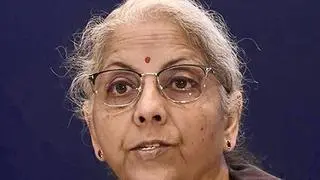Tax cuts to stimulate growth are unlikely this fiscal. This was made clear by TV Somanathan, Finance Secretary & Secretary, Department of Expenditure, Government of India, while addressing a Chennai International Centre event on ‘Managing the Nation's economy during Covid-19 times’ on Saturday.
He was responding to remarks about the strong buoyancy in revenue collections and whether that would give some room for the government to cut taxes to spur growth.
Tax collection
He said that while there is a sharp increase in tax collections, what is not apparent is the increase on the expenditure side.
“We are spending extra ₹ 1-lakh crore on food subsidy, we are sure to spend extra ₹20,000 crore of fertiliser subsidy because global fertiliser prices have shot up, we are likely to spend extra ₹15,000 crore on health and we have decided to clear ₹56,000 crore of old MEIS and SEIS arrears. So, ₹2- lakh crore of additional expenditure is already under the pipeline,” he added. He also said the government is keeping the powder dry for a possible third wave of the pandemic.
On disinvestment plan
On the government’s disinvestment plan, Somanathan said Air India and LIC will certainly happen this fiscal, BPCL and Concor disinvestments will happen either this fiscal or early in FY23.
He termed the lacklustre private investment as a source of concern. While some sectoral issues like in telecom have been addressed, the government, he said, is open to looking at other issues.
However, he emphasised that there will be no tax cuts to stimulate private investment. At the same time, he said that public capital expenditure this fiscal will be very close to the budget estimate as most ministries are doing their best to meet their targets.
Rural employment
On boosting rural employment, Somanathan said that the government will top up spending on MGNREGA which has reached its limit. He, however, said that growth is the best solution to boost employment, and it is for that reason that the government has come out with production-linked incentives (PLI) schemes in employment-intensive sectors.
In his opening remarks, Somanathan said protecting lives, protecting the poor & vulnerable, protecting subordinate levels of governments such as like State governments and local bodies, protecting macroeconomic vulnerability and preserving and enhancing future growth were the five key priorities for the government during the Covid crisis.
Somanathan said that the government had adopted a dual strategy by which the vulnerable were given direct subsidy (food using PDS and cash through Jan Dhan accounts) while other sectors were supported by credit support.








Comments
Comments have to be in English, and in full sentences. They cannot be abusive or personal. Please abide by our community guidelines for posting your comments.
We have migrated to a new commenting platform. If you are already a registered user of TheHindu Businessline and logged in, you may continue to engage with our articles. If you do not have an account please register and login to post comments. Users can access their older comments by logging into their accounts on Vuukle.